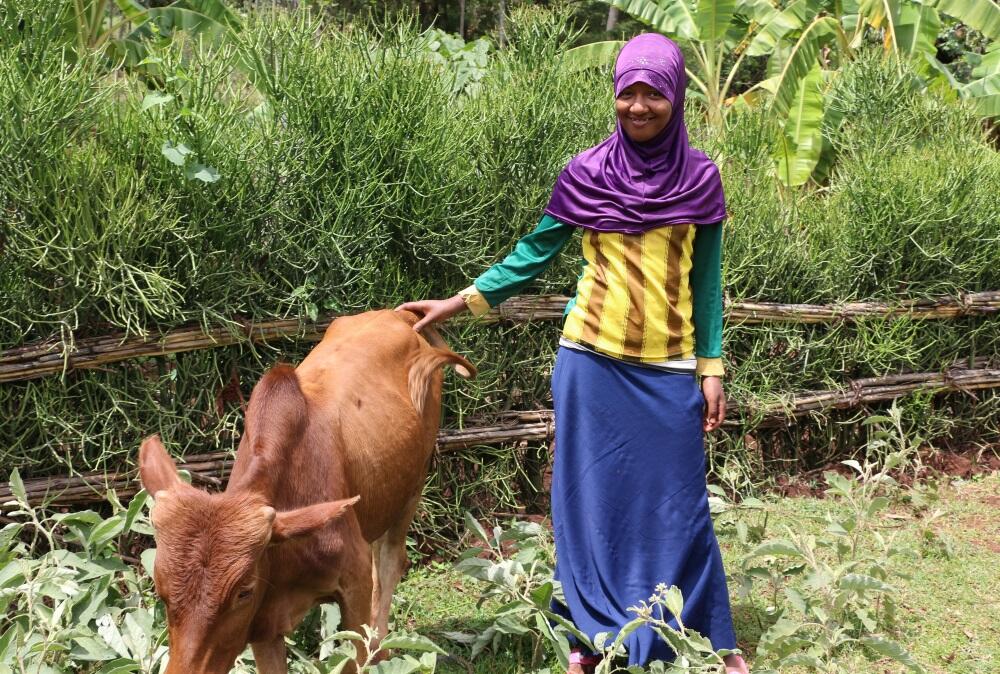SOKORU DISTRICT, Ethiopia—When Salia Shemsu failed the Grade 10 national exams two years ago her family was in no position to help her repeat the year, which effectively ended her formal education. As the first-born in her family – and a girl – back-breaking household chores became her full-time occupation while she waited for someone to ask for her hand in marriage.
In rural Ethiopia, early marriage is a typical fate for millions of girls.
Then Salia heard a call for young people in need to participate in a livelihood activity supported by a UNFPA-assisted programme, and she signed up. She joined four other girls from her community in the task of fattening farm animals for sale, a good business prospect as there is always high demand for quality farm animals in her area.
This opportunity has turned her life around – and that of her family.
I have become self-sufficient. I [am] buying the educational materials and school uniforms of my five younger siblings.
Business has been good so far and life has changed for the better, says shy and soft-spoken Salia, now 18 years old. “I have become self-sufficient. I [am] buying the educational materials and school uniforms of my five younger siblings. I am also buying fertilizers for my parents for their farm work,” she says proudly.
Reaching more than 5 million with youth-friendly SRH services

Sokoru District in the Oromia Region is one of 30 districts selected in 6 regions in Ethiopia for implementation of the second phase of the Joint UNFPA-UNICEF Programme on a Rights-Based Approach to Adolescent and Youth Development.
With funding from the Norwegian government, the programme is being implemented in 16 higher education institutions and 100 secondary schools in the six regions – Amhara, Oromia, SNNP, Afar and Tigray, as well as the Addis Ababa City Administration – in which about 80 per cent of Ethiopia’s population reside.
More than 5.5 million adolescents and young people have been reached to date through two phases of the joint programme since it was launched in 2007. It has been instrumental in increasing adolescent and young people’s access to an integrated package of rights-based information and services on sexual and reproductive health (SRH), as well as providing livelihood opportunities and various targeted social services.
The programme enhances the capacity of young people to claim their rights through an integrated package of youth-friendly services. It also strengthens the capacity of health facilities, youth centres and youth associations to address the needs of young people.
Salia is one of almost 13,000 marginalized and vulnerable adolescents and young people who are being empowered economically by a component of the programme supporting livelihoods.
Using peer-to-peer education to empower youth
So far, the programme has made a significant contribution to solving the challenges experienced by young people when it comes to their sexual and reproductive health, including HIV prevention. It is also addressing their development needs through imparting life skills, as well as ensuring access to SRH and HIV services at youth centres, health facilities and educational institutions, including universities. These interventions are increasing the risk perception and risk reduction skills of young people, particularly girls.

education at the girls' club she coordinates to empower others in
the broader community. © UNFPA Ethiopia Abraham Gelaw
Salelesh Edosa is the coordinator of a girls’ club, one of the peer-to-peer platforms created by the programme, at a youth centre in Sokoru District. Here, they hold fortnightly discussions to impart information and build knowledge to boost the girls’ self-confidence, in addition to discussions of the challenges the girls face, including their sexual and reproductive health. Up to 50 girls participate in the club discussions at a time, and these members also take the discussions to their respective communities when they return home, thereby increasing the programme’s reach.
Though Salia is not a member of the girls’ club, the information she has received from other girls who are taking part has been useful, and has given her the confidence she needed to embark on her current business undertaking. The business skills training she received prior to her engagement in the income-generating activity have also been vital. Her profitable business has changed her life, as well as that of her family.
I would have been married off by now if I didn’t get this chance, as my family does not have the means to support me for long.
“I would have been married off by now if I didn’t get this chance, as my family does not have the means to support me for long,” Salia says, hope etched on her face.
Her business group has already repaid almost half of the seed money it took out as a loan, while at the same time building savings with a microfinance institution, which is one of the sustainability measures of the programme.
The livelihood support she has received has helped her become self-sufficient and has been instrumental in ensuring that she, and other economically dependent young people like her, do not succumb to sexual and reproductive health challenges.
By Abraham Gelaw



